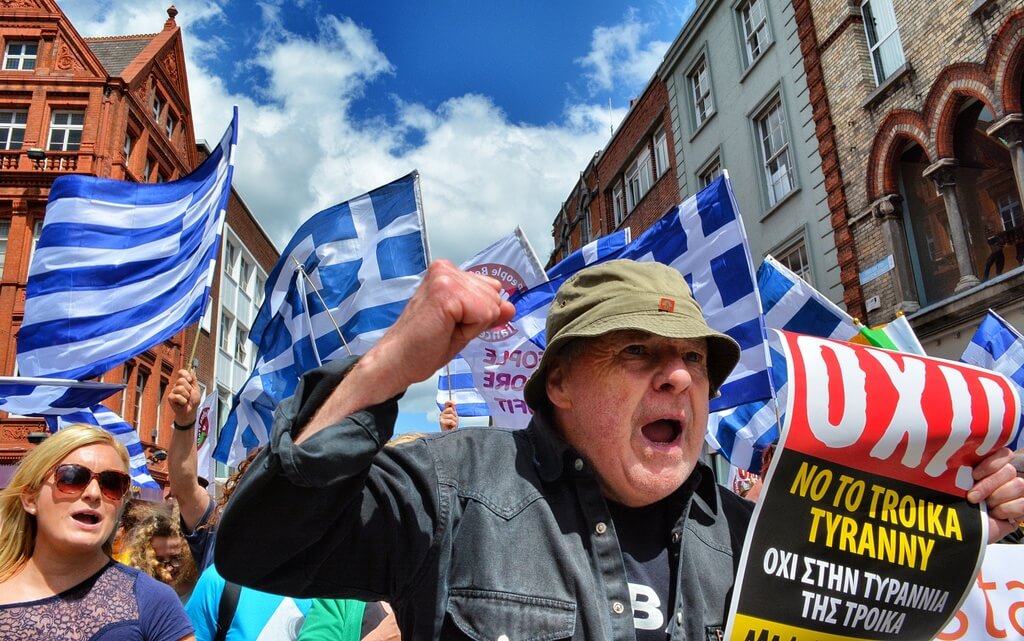Right now Europe and the world are looking towards Catalonia with mixed feelings. We are deeply concerned about the escalation of this situation by the Spanish government. Police repression and violence are never solutions for political conflict, no matter how we might assess the legal situation surrounding this referendum. This makes Catalonia something more than just “an internal matter of Spain”, despite President Juncker having declared it to be so several times.

On the contrary, we think this conflict is about Europe and the European Union as a whole. Not only because in recent years European Institutions have shown a quite different attitude to brutally intervening in the ‘internal affairs’ of individual member countries, such as the notorious imposition of austerity on Greece by the Troika. And not only because political engagement on the part of the European Union, albeit together with other more neutral negotiators, could have a positive mediating role. There’s more. Despite its historical specificities, recent developments in the ‘Catalan crisis’ are symptomatic of a deeper disease: the crisis of democracy in state institutions as we know them.
Pictures from last Sunday show tens of thousands of committed people – women and men, young and old – actively disobeying the use of force, deployed against their “right to decide” and vote on their own future; theirs is a strong demand for democracy and self-determination, that goes far beyond the classic issue of ‘national independence.’
Faced with the uprooting violence of economic globalization, the disastrous magnitude of the ecological crisis and the exponential growth of social inequalities, the classic nation-states have shown their inability to address the major challenges of our time. Ten years of economic crisis have exacerbated this. By extension, however, if the national space, and the exercise of representative democracy within national borders has been incapable of counteracting the flows of financial capitalism, it seems unlikely or unrealistic that a smaller-scale replication of this can do so.
In the case of the ‘Catalan crisis’, we think it is wrong to be forced to choose between defending an authoritarian centralized Spanish state, and the unilateral proclamation of an independent ‘state of Catalonia’. Nonetheless we maintain that the population of the region must be in a position to freely decide its destiny in a democratic way, with respect for the majority of its people.
From a strategic point of view, we need a third option, a radically different approach. Beginning from the principle of “proximity” we must bring political decision-making as close as possible to people and their communities, starting from a principle of ‘self-government’, rising bottom-up from cities. Beyond this, we also have to imagine that such autonomous territories can be organized federally on a wider scale, beyond the traditional nation-state limits and nationalistic chauvinism, in a renewed pact of coexistence and sharing.
The ‘Catalan crisis’ is therefore an opportunity to open a transnational debate about democracy in Europe, about the kind of Europe we want now and in the future, a debate about how to develop a constituent process that meets the challenges and risks that we are facing. In order to do this it is crucial we follow the road set-out with clarity and courage by the municipal platforms in Spain and Catalonia. Now is the time to stop repression and unilateral decision-making, to follow the example of Ada Colau and Pablo Iglesias, Manuela Carmena and Alberto Garzon. It is time to reclaim politics against the use of force. It is time to set up dialogue for coexistence.
There is always space to find a peaceful solution. Now is the moment for a Europe-wide mobilization in support of the spirit of the Zaragoza Declaration. We are here to do our part. Because today, in Spain and Catalonia, the present and future of democracy in Europe, and the republican values and citizen rights of the European Union, are at stake.
**
Katja Kipping is an MP in the German Bundestag and chairwoman of Die Linke (the Left party)
Nicola Fratoianni is an MP in the Italian Parliament and national secretary of Sinistra Italiana (Italian Left party)
Featured Image by HajjiBaba via Wikimedia Commons
![Political Critique [DISCONTINUED]](https://politicalcritique.org/wp-content/uploads/2015/09/Political-Critique-LOGO.png)
![Political Critique [DISCONTINUED]](https://politicalcritique.org/wp-content/uploads/2015/09/Political-Critique-LOGO-2.png)